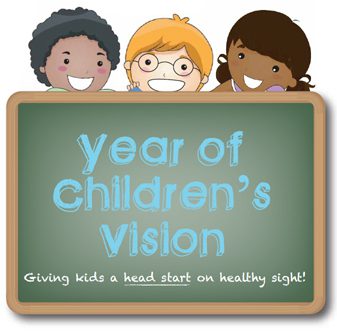Leading Vision and Public Health Groups Collaborate to Promote “Year of Children’s Vision”
– New National Program Created to Help Improve Children’s Eye Health Programs in Early Education Programs Across the Country–
CHICAGO (Oct. 23, 2013)– Prevent Blindness America, through its National Center for Children’s Vision and Eye Health, the National Head Start Association, and other national eye health organizations are collaborating on a new initiative called the “Year of Children’s Vision” (YOCV).
The goal of the YOCV is to provide national guidance to staff of Head Start and other early childhood programs to standardize approaches to vision screening, improve follow-up for eye care for children who do not pass vision screening, provide family-friendly educational information, and consult with the nation’s leading pediatric eye care providers to ensure best practices for children’s eye health. Other organizations or individuals are encouraged to support the YOCV initiative and promote healthy vision for young children.
The Year of Children’s Vision launches today, October 23, 2013, and extends through April 2014. Each month, YOCV partner organizations will provide educational presentations, topical resources, and technical assistance opportunities. Each monthly activity will be linked back to the YOCV program website on which all information will be housed for future reference. Key YOCV activities include:
-
- A national survey of Head Start health managers and staff to assess their vision screening practices, barriers, and needs.
-
- A focus group discussion with staff and parents whose children attend Head Start to learn more about vision screening and eye health barriers and needs.
-
- A monthly vision topic discussion that will lead to improved screening quality and better vision and eye health for children in Head Start and other early childhood programs (topics to include: appropriate vision screening methods, improved follow-up for eye care, professional development, and education for families).
-
- Downloadable resources supporting the monthly discussion themes that program staff can integrate into their vision screening efforts.
-
- A half-day panel presentation at the National Head Start Association’s 30th Annual Head Start Parent Conference and Family Engagement Institute designed to educate and empower families about how they can be a better partner in the health of their child’s vision (December 9-13, 2013; Atlanta, Ga.).
-
- A presentation and exhibit on the YOCV at the National Head Start Association’s 41st Annual Head Start Conference to connect members of the NHSA to vision screening information, resources, and services (April 28-May 2, 2014; Long Beach, Calif.).
“Our children depend on their eyes to learn and view the world around them,” said Hugh R. Parry, president and CEO of Prevent Blindness America. “They also depend on us to make sure they have healthy vision and can reach their full potential. With this new, comprehensive program that brings together parents, early educators, and health professionals, we can help keep that promise to kids to work together to keep their futures bright.”
The U.S. Preventive Services Task Force recommends vision screening for all children at least once between the ages of 3 and 5 years and suggests that vision screening tools can be useful in detecting visual impairment, including abnormal refractive errors, strabismus, and amblyopia. The federal Office of Head Start requires all children in Head Start programs to receive a vision screen or have screening results on file within 45 days of a child’s enrollment. Vision impairments are common conditions among young children, affecting 5 to 10 percent of all preschool-aged children.[i] If not detected and treated early, vision impairment could affect all aspects of life, negatively impacting a child’s ability to learn, athletic performance, and self-esteem. According to the Centers for Disease Control and Prevention, impaired vision can affect a child’s emotional, neurologic, and physical development by potentially limiting the range of experiences and kinds of information to which the child is exposed.[ii]A leading preschool vision screening study notes that vision screening is critical to the welfare of our children and can have an impact not only on vision and eye health but also on social development and productivity.[iii]
For more information on the national Year of Children’s Vision initiative, children’s eye health, or to assist with providing planned monthly activities or topical resources for the YOCV, please call 1-800-331-2020 or visit http://nationalcenter.preventblindness.org/year-childrens-vision.
About Prevent Blindness America and its National Center for Children’s Vision and Eye Health
Founded in 1908, Prevent Blindness America is the nation’s leading volunteer eye health and safety organization dedicated to fighting blindness and saving sight. Focused on promoting a continuum of vision care, Prevent Blindness America touches the lives of millions of people each year through public and professional education, advocacy, certified vision screening and training, community and patient service programs and research. In 2009, Prevent Blindness America established the National Center for Children’s Vision and Eye Health, with funding and leadership support from the HRSA- Maternal and Child Health Bureau. Serving as a major resource for the establishment of a public health infrastructure, the National Center advances and promotes children’s vision and eye care, providing leadership and training to public entities throughout the United States. The National Center is advised by a committee of national experts and leaders from the fields of ophthalmology, optometry, pediatrics, nursing, family advocates and public health to guide the work and recommendations of the Center. For more information, or to make a contribution to the sight-saving fund, call 1-800-331-2020. Or, visit www.facebook.com/preventblindness.
About the National Head Start Association (NHSA)
The National Head Start Association is a non-partisan, not-for-profit organization committed to the belief that every child, regardless of circumstances at birth, has the ability to succeed in life. The opportunities offered by Head Start lead to healthier, empowered children and families, and stronger, more vibrant communities. NHSA is the voice for more than 1 million children, 200,000 staff and 1,600 Head Start grantees in the United States.
About the American Association for Pediatric Ophthalmology and Strabismus
The American Association for Pediatric Ophthalmology and Strabismus (AAPOS) is the largest association of eye physicians and surgeons dedicated to promoting the highest quality medical and surgical eye care worldwide for children and for adults with strabismus. AAPOS’s goals are to advance the quality of children’s eye care, support the training of pediatric ophthalmologists, support research activities in pediatric ophthalmology, and advance the care of adults with strabismus. AAPOS establishes practice guidelines for pediatric ophthalmology at the highest level of competence and ethics, and fosters concepts that benefit children’s eye health through preventive as well as remedial activities. Children deserve eye care that is evidence-based, and the adults who care for children need the necessary information to make informed choices about their care. AAPOS collaborates with groups interested in improving the quality of care that our patients receive.
About Good-Lite, Inc. and School Health
The Good-Lite Company has manufactured and sold evidence-based eye charts, illuminated cabinets, and other vision screening and testing tools nationally and internationally for 83 years. Good-Lite’s commitment to quality is only surpassed by its commitment to customer service. School Health Corporation is a family-owned company that has served the school nurse and early education community for more than 60 years. School Health prides itself on being a respected name in health supplies for schools and athletic associations, and most recently in special education through the acquisition of EnableMart, the #1 source for assistive technology.
________
[i] Calonge N. Screening for visual impairment in children younger than age 5 years: Recommendation statement. Ann Fam Med. 2004;2:263-266.
2 National Center on Birth Defects and Developmental Disabilities, Centers for Disease Control and Prevention. Vision impairment among children. Available at: http://www.cdc.gov/ncbddd/developmentaldisabilities/documents/VisionImpairment.pdf. Accessed August 23, 2013.
3 Hartmann EE, Bradford GE, Chaplin PK, Johnson T, Kemper AR, Kim S, Marsh-Tootle W; Project universal preschool vision screening: a demonstration project. Pediatrics. 2006;117:226-237.
Download a copy of the Year of Children’s Vision press release.


